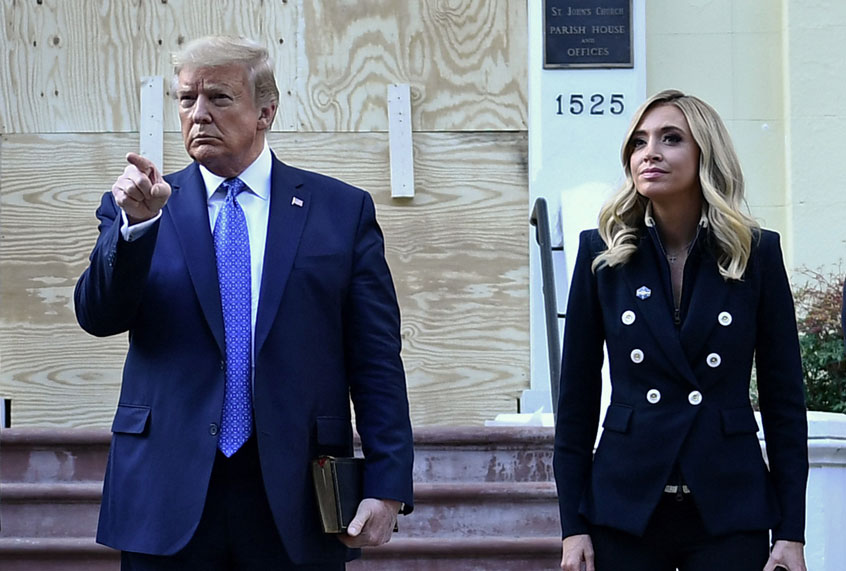White House Press Secretary Kayleigh McEnany and President Donald Trump seem to be having very different reactions to two cases in which the Supreme Court rejected his arguments on Thursday, resulting in absurdly contrasting statements from a pair that is supposed to speak with one voice.
The arguments came in two cases, one dealing with Congress and another with New York DA Cyrus Vance, in which the parties sought Trump’s personal financial information. In both cases, Trump argued that his role as president makes him immune to such inquiries. The Supreme Court flatly rejected this assertion of privilege and argued that he’d have to make more conventional arguments in the lower courts to fight the subpoenas.
When the rulings came down, the president was clearly furious. It was evident on his Twitter timeline:
The Supreme Court sends case back to Lower Court, arguments to continue. This is all a political prosecution. I won the Mueller Witch Hunt, and others, and now I have to keep fighting in a politically corrupt New York. Not fair to this Presidency or Administration!
— Donald J. Trump (@realDonaldTrump) July 9, 2020
Courts in the past have given “broad deference”. BUT NOT ME!
— Donald J. Trump (@realDonaldTrump) July 9, 2020
…Won all against the Federal Government and the Democrats send everything to politically corrupt New York, which is falling apart with everyone leaving, to give it a second, third and fourth try. Now the Supreme Court gives a delay ruling that they would never have given…
— Donald J. Trump (@realDonaldTrump) July 9, 2020
He wasn’t even making coherent arguments, but he was clearly upset about the rulings.
But that’s not what McEnany would have us believe. In a statement, she said Trump was “gratified” by the ruling in the case concerning Congress’s subpoena:
As the Court made clear, the limited authority of Congress to conduct fact-finding through subpoenas must be used in aid of Congress’ authority to legislate and must be tied to a valid legislative purpose. Congress may not act as a roving investigative body, especially against a co-equal branch of government.
She added:
In the accompanying decision in Trump v. Vance, the Court also protected the President’s financial records from intrusive subpoenas from a partisan district attorney. As the Court determined, the New York district attorney has not yet established his ability to secure access to those records. Instead, further proceedings are required in the lower court in which the President can raise additional arguments, including constitutional protections, against this frivolous and politically motivated subpoena.
What she ignored in both cases is that the court rejected Trump’s arguments that he should be able to reject all such subpoenas. The court did send the cases back to the lower courts to be argued further — likely delaying any decision past the November election — but it put him on a weaker footing because he doesn’t have the option of using the presidency as a complete screen against investigative scrutiny.
Observers in the media clashed about whether the ruling should be seen as a win or a loss for Trump, but it was particularly striking that the White House couldn’t even tell a single story about what happened.
When Trump was asked about the rulings later by, he said they are “basically starting all over again, sending everything back down to the lower court.” He added: “So, from a certain point I’m satisfied, on another point I’m not satisfied because frankly, this is a political witch hunt.”
But during her briefing with reporters, McEnany declared victory.
“How is President Trump feeling about the two justices he appointed to the Supreme Court?” a reporter asked. “They ruled against him today.”
“The justices are entitled to their opinion. This is an independent branch of government,” said McEnany. But she said the language of the opinions made it clear that “this was a win for the president.”
Q: “How is Pres. Trump feeling about the two justices he appointed to the Supreme Court… they ruled against him today?”@PressSec: “The Justices are entitled to their opinion, this is an independent branch of gov. But as for the decision… this was a win for the president.” pic.twitter.com/EaWHbB9k7V
— CSPAN (@cspan) July 9, 2020


